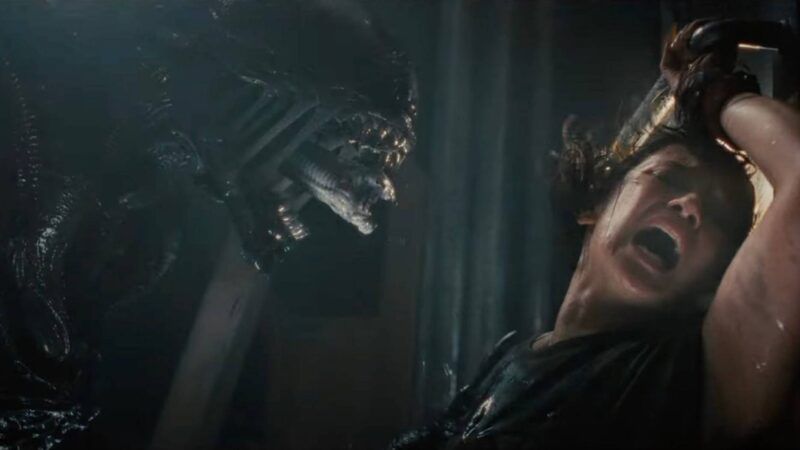Alien: Romulus Is a Slick, Empty Franchise Pastiche
The taut, grisly new entry plays like a greatest-hits reel.

Before we talk about the energetic-but-empty Alien: Romulus, we need to talk about the Alien movie franchise.
When Ridley Scott's Alien debuted in 1979, it helped set the template for both horror and sci-fi films for decades to come. The film, which pitted a slimy, chest-bursting xenomorph against a crew of what were essentially space truckers, was a monster movie set in space, a slasher film, like Halloween almost, except with grizzled laborers complaining about corporate stinginess instead of libidinous teens frolicking in the 'burbs.
But it wasn't just a sci-fi slasher film: It was also a movie about the era's labor and gender politics, in which blue-collar workers are exploited and oppressed by the omnipresent Weyland Yutani corporation and female strength and sensibility are overlooked due to the less-humane interests of the overseer class. Alien practically invented the Strong Female Character, at least as we know it today. It was a blood-pulsing thriller about an alien monster who seeded inside people's lungs, tore open people's chests, and had acid for blood. But it was also a social commentary about surviving the perils of an uncaring modern world.
James Cameron's 1986 follow-up, Aliens, changed the game again, transforming the franchise into a neo-Vietnam film that, among other things, skewered both America's military bravado and the macho excesses of the decade's muscle-bound action heroes. (Amusingly, shortly before making Aliens, Cameron had co-scripted one of the films that defined that macho ethos, Rambo: First Blood Part II). In the 1990s, French director Jean-Pierre Jeunet made Alien Resurrection, a gooey meditation on the pain of both literal parenthood and middle-aged creativity. When Ridley Scott returned to the franchise in the 2010s with Prometheus and Alien: Covenant, he once again explored the idea of survival in a cold and pitiless world.
Even David Fincher's much-maligned, incredibly underrated Alien 3, had, at its heart, a sort of gorgeously gloomy nihilism—a profound sense of existential futility and, er, alienation that would remain present in Fincher's later, more celebrated work. Even if you think it's a bad movie, it's still recognizably a David Fincher film.
(And then, yes, yes…there were the two Aliens vs. Predator movies, both of which were just bad. We'll ignore those.)
But the point is that, ill-advised franchise crossovers aside, the Alien films have always been showcases for directorial obsessions and sociological observation, reflections of their eras and the people who made them.
Which brings us back to Alien: Romulus. Directed by Fede Álvarez, who made the excellent monster-in-the-house thriller Don't Breathe and a snazzy reboot of Sam Raimi's Evil Dead franchise, Romulus is punchy, slick, and occasionally ingenious, with a handful of chest-pounding action set pieces.
But its big idea seems to be…that the Alien films are really, really cool. Which is true. But it's also not enough.
The result is a movie that plays like a spiffy highlight reel from the franchise, a greatest hits album of elements drawn primarily from the first two films, but with clear nods to all the other entries in the series. These warmed-over bits are stitched together with just enough story to maintain a veneer of plausibility, and the execution is taut and tense. But these are leftovers, expertly reheated.
It's rarely a good sign when a movie's marketing team has to invent an ungainly new term to describe what kind of sequel it is, but Alien: Romulus has staked out new ground as an "interquel," set in the decades between the first and second films in the series.
The film opens on a brutal, sunless Weyland Yutani mining colony, where a group of workers just want to escape the corporate drudgery. Among them is Rain (Cailee Spaeny), whose dysfunctional robot companion Andy (David Jonsson) she treats as a sort of disabled brother. Rain is lured into a scheme to rob an abandoned Weyland Yutani research station orbiting the planet.
Things do not go as planned—and by "do not go as planned," you understand that I mean there are a bunch of slimy aliens with acid for blood waiting for them, and a lot of people end up dead. From this familiar setup, Álvarez plays the hits, getting out a plussed-up version of the pulse rifle from Aliens and practically replicating that movie's elevator-oriented third act. There's a final twist that calls to mind both Aliens and the gloopy body-horror erotica of Alien Resurrection, as well as a heavy dose of Ridley Scott's Alien mythology, including direct references to the divisive prequel Prometheus.
It's a reasonably effective pastiche, but that's all it is: a pastiche. And because it's so devoted to serving up franchise comfort food, it ignores the deft character work and intricate world building that helped keep the franchise alive for so many years. Andy undergoes a dramatic personality shift that makes him the movie's most interesting character, and there's a surprise late-movie appearance that attempts to connect to the franchise's multidecade lore, but too much of the cast is forgettable or vaguely annoying. Indeed, the movie improves after several of the supporting players inevitably die off. (Spoiler alert: It's an Alien movie, folks! People die.)
What's missing is the sense that the movie exists to serve something other than franchise fandom and fond memories of the earlier entries. Romulus isn't a bad movie, exactly, but it's disappointingly vacuous, a slick franchise placeholder that's been strangled into submission by the ruthless, unkillable monster it created.


Show Comments (27)